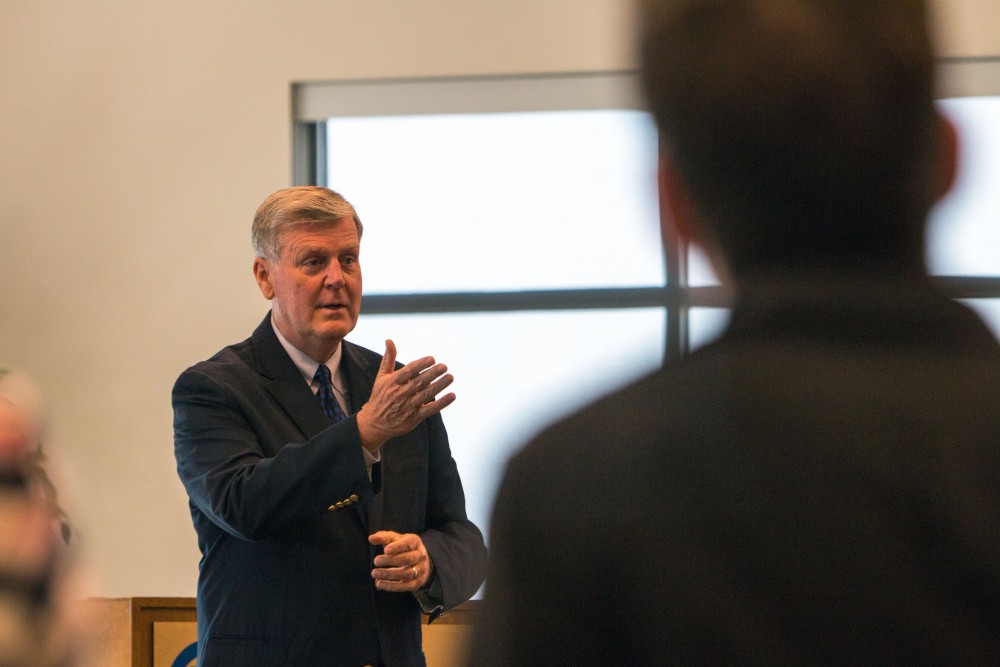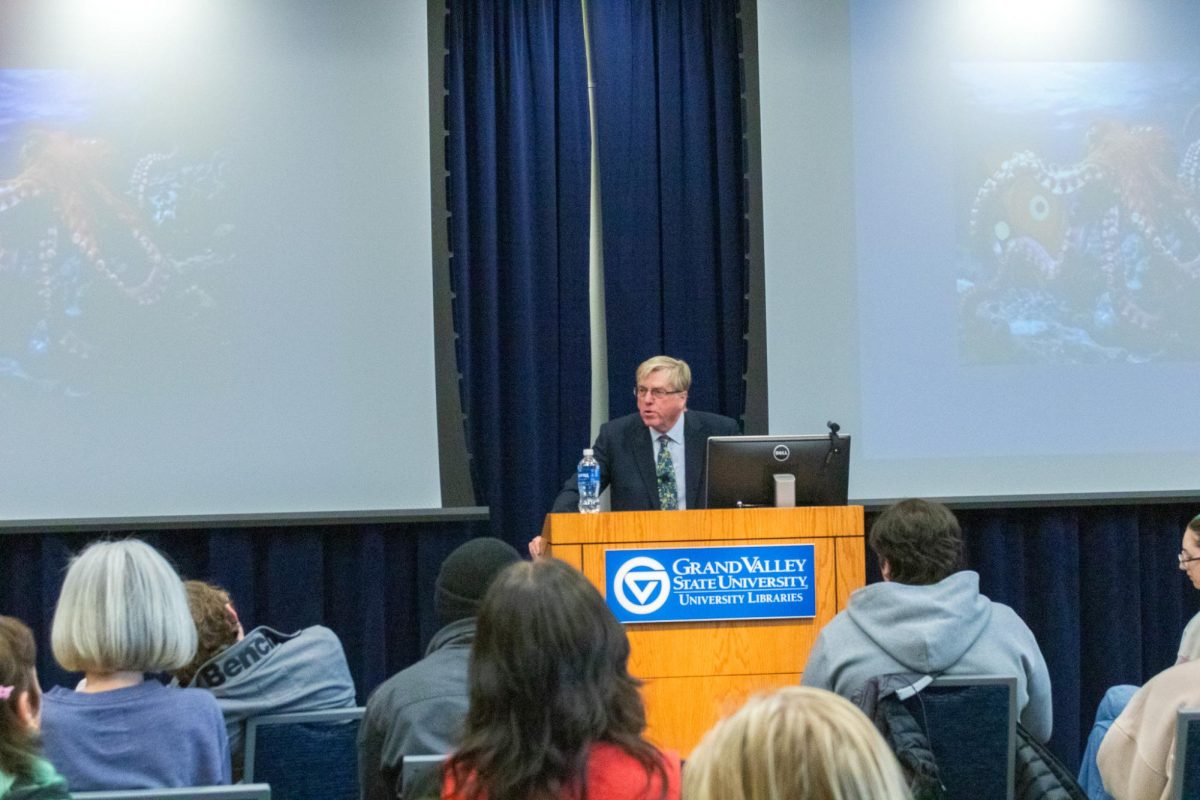GVSU students, administration respond to Trump’s DACA announcement

GVL / Spencer Scarber President Thomas Haas speaks to Student Senate during their first session on Thursday August 31, 2017.
Sep 11, 2017
On Tuesday, Sept. 5, the Trump administration announced its plan to end the Deferred Action for Childhood Arrivals (DACA) program in six months. In light of this announcement, members of the Grand Valley State University and Grand Rapids communities expressed their support for DACA and DACA students with meetings, statements and demonstrations.
Roughly 300 people gathered together in Grand Rapids that Tuesday and paraded the streets in support of DACA. According to MLive.com, protestors walked across the Blue Bridge and along Pearl Street and ended with a candlelight ceremony at Calder Plaza. During the ceremony, many DACA recipients expressed their concerns and described how they benefitted from the program.
That evening, GVSU President Thomas Haas sent out a mass email to the entire GVSU campus community. In his email, he addressed the concern caused by the declared six-month remainder of the DACA program.
His email in part read, “It is worth reinforcing that Grand Valley State University has a history of providing a quality education with inclusion as a steady value. This is unchanged.”

On Wednesday, Sept. 6, GVSU’s Latino Student Union (LSU) held an emergency meeting to discuss the confusion and upset surrounding the previous day’s announcement.
LSU members explained that the change in the DACA policy does not only affect DACA and undocumented students, but it affects all students at GVSU.
The DACA program was established by the Obama administration in 2012 to give children of undocumented immigrants the opportunity to receive schooling, a work permit and a driver’s license. It is not, however, a means to citizenship.
LSU opened its emergency meeting to all GVSU faculty, staff and students. Members of LSU offered information on what DACA is, who it affects, and how and why students at GVSU should care.
Noemi Jimenez, LSU member and president of Laker Familia, shared a personal story of her family member who is DACA recipient, explaining how the Trump administration’s actions affect both her family member and herself. Jimenez stressed the importance of sharing personal stories, as they humanize the issue.
To show support, multiple members of GVSU’s administration attended the meeting, including Jess Bernal, vice president for the Division of Inclusion and Equity, who took a moment to personally respond to the issue.
Bernal assured students of the continuous campus support and protection of all students at GVSU, regardless of status. Additionally, he explained, GVSU administration is undertaking many actions behind the scenes. But, for the sake of students’ privacy, they are hesitant to relay specifically what these actions are.
Bernal reminded students that the Office of Multicultural Affairs (OMA) is open to not only undocumented or DACA students who may need assistance with resources, but to any student who may want to discuss details of the recent changes in the DACA policy.
“We are here to answer questions,” Bernal said. “We want to take the lead from those impacted.”
Bernal echoed Haas’ statements of support made in his university-wide email, particularly addressing GVSU’s value of inclusion. In his email, Haas reassured students of GVSU’s stance on education, saying, “It is our long-standing practice to admit qualified students without regard to citizenship status and to support all students pursuing a Grand Valley degree.”
LSU has its own plans to support and advocate for DACA students with care packages and opportunities for students to call senators to voice their concerns. Students can visit the OMA in Room 1240 of the Kirkhof Center to participate in these initiatives. Members of LSU also hope GVSU’s administration will take a more direct approach toward aiding DACA students.
“We hope the administration as a whole will be more vocal with what they are doing specifically, not just a general statement, but actual steps,” Jiminez said. “It’s reassuring to know what they are going to do with more transparency. …
(Haas) has done a good job so far listening to DACA students, but we would like to see more steps for how GVSU, as a whole, is going to help and support DACA students. And regardless of what happens, students are still able to come to school because after all, they are here to get an education.”
Vanessa Sanchez, president of LSU, appreciates the email but hopes Haas will continue to display his support by potentially donating personally and further acknowledging DACA students by creating awareness among other GVSU students.
“It trickles down after the heat of the moment, but we’re still here,” Sanchez said. “We still need to keep that fire lit.”
On Thursday, Sept. 7, GVSU’s student senate released a statement regarding DACA on the organization’s Twitter account. An excerpt of the statement reads, “We stand with our DACA students and are collectively stronger together, both as a university and community. Our highest priority is to provide an equal and inclusive education for all students.”
The statement also addressed the senate’s partnership with GVSU’s Division of Inclusion and Equity, their social justice centers and the Dean of Students Office.
The next six months consist of many unknowns, but Haas, along with various student organizations, hopes to work through it as a community.






















